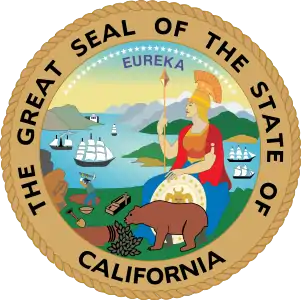California Senate Bill 27
California Senate Bill 27 (SB 27), alternatively known as the Presidential Tax Transparency and Accountability Act, is a California law that requires candidates running for either President of the United States or Governor of California to publicly release their tax return of the previous five years in order to be listed on the primary ballot.[1][2][3] The bill, authored by State Senators Mike McGuire and Scott Wiener, was signed into law by Governor Gavin Newsom on July 30, 2019.[2]
| California Senate Bill 27 | |
|---|---|
 | |
| California State Legislature | |
| Full name | An act to add Chapter 7 (commencing with Section 6880) to Part 1 of Division 6 of, and to add Part 5 (commencing with Section 8900) to Division 8 of, the Elections Code, relating to elections, and declaring the urgency thereof, to take effect immediately. |
| Status | Law |
| Introduced | December 3, 2018 |
| Assembly voted | 57-17 |
| Senate voted | 29-10 |
| Signed into law | Yes |
| Sponsor(s) | Mike McGuire |
| Governor | Gavin Newsom |
| Code | Elections |
| Website | http://leginfo.legislature.ca.gov/faces/billNavClient.xhtml?bill_id=201920200SB27 |
Status: Current legislation | |
The law does not place the requirement to publicly release tax returns on candidates running as write-in candidates.[4]
A similar bill was vetoed in 2017 by Governor Jerry Brown. In vetoing the bill, Brown cited the slippery-slope argument as well as his concern that the law would be struck down by the courts as unconstitutional.[5]
Court challenges
Within a week of the bill being signed into law, it was challenged in court. The Trump re-election campaign, the California Republican Party, and Judicial Watch all filed lawsuits challenging the constitutionality of the law. The suit by Judicial Watch is on behalf of four California voters.[5][6]
On September 19, 2019, U.S. District Judge Morrison England issued a temporary injunction against enforcement of the law with a promise for a final ruling by the end of the month. In issuing the injunction, the judge made reference to the Ethics in Government Act as preempting the law under consideration.[7]
On November 21, 2019, the California Supreme Court unanimously determined the law violated the California Constitution[8] and that President Donald Trump must be allowed to appear on the March 2020 primary ballot. Chief Justice Tani Cantil-Sakauye delivered the 7-0 decision.[8] The Attorney General of California is appealing the September ruling in a federal appeals court, with a decision expected after the March 2020 primary election.[9]
References
- "Bill Text - SB-27 Primary elections: ballot access: tax returns". leginfo.legislature.ca.gov. California, U.S.: Government of California Legislature. Retrieved 2019-11-16.
- "Governor Gavin Newsom Signs SB 27: Tax Transparency Bill". California Governor. California, U.S.: Government of California Legislature. 2019-07-30. Retrieved 2019-11-16.
- Editorial Board, Sacramento Bee. "Gov. Newsom should save the jokes for Twitter and veto this silly but dangerous bill". Sacramento, California, U.S.: The Sacramento Bee.
- Myers, John (July 30, 2019). "Trump's tax returns required under new California election law". Los Angeles Times.
- Canon, Gabrielle (August 6, 2019). "Trump campaign sues California over new law requiring candidates to release tax returns". Palm Springs Desert Sun.
- Jagoda, Naomi (August 5, 2019). "Voters sue California over tax return law targeting Trump".
- Myers, John (September 19, 2019). "Federal judge blocks California law to force disclosure of Trump's tax returns". Los Angeles Times.
- Brian Melley, Associated Press (November 21, 2019). "California court invalidates law requiring Trump tax returns". San Francisco Chronicle, SFGate.com. Retrieved November 22, 2019.
The law, the first of its kind in the nation and aimed squarely at Trump, violates a specification of the state constitution calling for an “inclusive open presidential primary ballot,” the court said.
- https://www.latimes.com/california/story/2019-11-21/trump-taxes-ballot-california-supreme-court